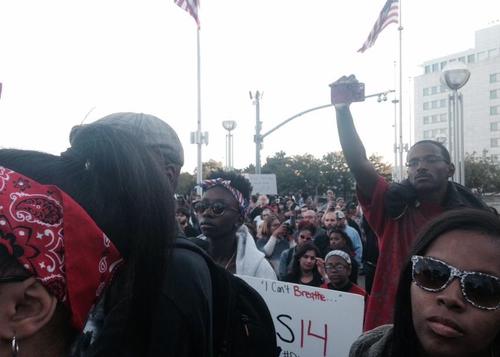
A large crowd of Detroiters joined thousands of Americans in cities across the country Thursday evening to remember the life of Michael Brown—an unarmed, 18-year-old African American fatally shot by police outside of St. Louis on Saturday—and to call for an end to police brutality.
Just after 7 in the evening, Whitney Syphax Walker, local poet and organizer, commanded a microphone beneath the arching Transcending statue in Hart Plaza; nearing 7:20pm, she called for a moment of silence. For several silent moments the crowd stood, heads bowed, until the quiet was broken by a call from the crowd: "We've been silent too long!" a man shouted. A call-and-response rally followed: "No Justice! No Peace!"
Walker introduced several speakers and poets to the microphone over the course of the evening, including the Rev. David Alexander Bullock, of the Greater St. Mathew Baptist Church; poet, hip hop artist and Kresge Literary fellow Chace "Mic Write" Morris; and the singer Monica Blaire.
A smaller gathering, organized by Detroit poet Chantel Watkins, arrived earlier to display signs on Jefferson Avenue and to extend the vigil to the list of other people of color who have lost their lives to police brutality; another woman in the crowd passed out flyers with a running list of over fifty names. The T-shirt Whitney Walker wore read "Emmitt & Amadou & Sean & Oscar & Trayvon & Jordan & ..."
The rally and remembrance, in Detroit and across the country, began with conversations on social media, largely Facebook and Twitter. The blogger Feminista Jones is credited with starting the dialog in a series of tweets sent out on Sunday. The rallying hashtag #NMOS14—National Moment of Silence 2014—caught on, and organizers across the country began planning.

The national event had a pointed significance in Detroit, which was for decades the largest majority black city outside of Africa, losing that distinction only through overall population loss but still retaining a more than 80 percent African American population and a troubled history of race relations.
Still, the causes that brought the crowd—diverse in race and ethnicity, age and gender identity—were universal. "Where justice is denied for one it is compromised for all," read a sign that one man held.
Walker encouraged everyone to continue talking and organizing for justice beyond the event. "Coming to a vigil is not the work," she said. "It doesn't end here."
The list of names on her shirt, it bears noting again, ends in an ellipsis.



 by
by







